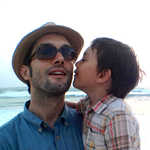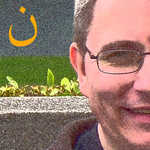As one would expect, surfing is pretty huge in the Surf Coast Shire, home of Bells Beach, an important Australian venue for this sport. Bells is also the location of the annual aboriginal titles competition which, in 2012, was reestablished after a gap of 15 years. Opening Ceremony, National Aboriginal Surfing Titles, 2012
Tom Avery flies an aboriginal flag while surfing.
When I first read the abstract below, I thought ‘what a lot of meaningless jargon’. But, on closer reading, it’s an interesting paper. Not least because 15 years ago it suggested aboriginal surfing events could be considered an effective strategy for rewriting contemporary indigenous people into the national identity story.
”Mainstream surfing in Australia is a discursive cultural practice, institutionally sanctioned as integral to national identity. Surfing represents the nation through a mode of white heterosexual orientation that is encoded into its practices and its texts. Surfing represents an historical transformation in the national psyche from the bush, inaugurated by the nation’s literary canon, to the beach, which has become the modern site of the nation’s identity. Indigenous surfing provides an oppositional view of nation and country that reinscribes the beach with cultural meanings specific to Aboriginal cultures. Surfing in this context can be seen as a reclamation of culture and a challenge to the dominance of white conceptions of nation and identity. This paper examines the indigenous surfing film, “Surfing the Healing Wave” and explores the film’s representations of histories that are relevant to Aboriginal people. The film’s narrative disruption of the surfing film genre instates a pedagogical practice that functions to reinscribe Aboriginal culture and Aboriginal histories through the contemporary event of the indigenous surfing contest.”
McGloin, Colleen, 2007, “Aboriginal surfing: reinstating culture and country”, International Journal of the Humanities, 4(1), 93-100.
McGloin starts her piece with quotes from two native surfers:
”When Aboriginal people are in the ocean, they know they are in their country. They belong to it. They don’t own it … we know there’s always another wave. Surfing’s about being part of the wave.” G. Dhinawan,
”Some fellas, they talk about ripping the wave to pieces. I reckon the wave tells you what to do, just catch the wave and ride the wave, flow with what the wave’s doing. And if you get a good score for it, well that’s good. If you don’t, you had a good time riding the wave.” K. Slabb





